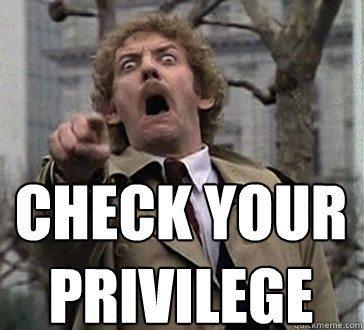Note: This article is the pro position of a point-counterpoint. To read Alex Horn’s con position, click here.
Time Magazine recently published Princeton University student Tal Fortgang’s article, “Why I’ll Never Apologize for My White Male Privilege.” In the feature, Fortgang describes being targeted with the phrase “check your privilege,” suggesting that the expression degrades all that he has personally accomplished by attributing it to his advantaged background. He refutes what he perceives to be a degradation of his accomplishments by discussing the lack of privilege that his ancestors faced when escaping from persecution by the Nazis.
His argument is flawed on two levels. First of all, privilege means that an individual is born into a societally advantageous scenario, whether socioeconomically, racially, sexually, or otherwise. Just because one’s ancestors were not privileged does not mean that their descendants cannot be.
The second flaw, which is much more significant than the first, is that that Fortgang completely misinterprets the meaning of the phrase “check your privilege.” It is not an attempt to disparage one’s accomplishments, a request that one apologize for being white, male, or rich, or anything else that might give a person an edge in our unfortunately prejudicial, unfair society. It is simply a beckoning for those who have a step up at birth due to factors they can’t control to recognize that they have an advantage and use their increased influence to try and increase the equity of society. “Check your privilege” is not an insult, or a degradation, or a belittling of one’s achievements; it is just a clarification that a social hierarchy exists, and that all people, privileged or otherwise, should be cognisant of the lack of social equity that exists in society.
Furthermore, Fortgang suggests that privilege based on racial or sexual characteristics is a myth, referring to America as “a country that grants equal protection under the law to its citizens, that cares not about religion or race, but the content of your character.” He fails to comprehend that a hierarchy does exist in society. It is not prevalent, overarching, or blatant; but it is there, insidiously creeping underneath societal interactions and judgements. Racial, sexual, and religion-based prejudices are apparent in politics, pop culture, sports, and general everyday interactions. The influence of these prejudices varies from area to area, and it is impossible for a white person living in a largely equitable community to understand why a black person from a racist community feels as targeted as he does.
It is imperative that everyone, black or white, male or female, Christian, Jewish, Muslim or otherwise, recognizes that social prejudices are real. They can be overcome, but only if society recognizes that they still persist in our society. Tal Fortgang’s position represents that of many similarly misinformed individuals who fail to look beyond their own communities and do not recognize that others were born into predicaments far less fair than their own.







